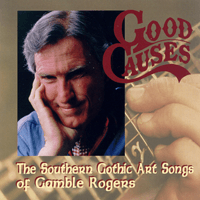Good Causes
| Good Causes | ||||
|---|---|---|---|---|
 | ||||
| Studio album by Gamble Rogers | ||||
| Released | 2003 | |||
| Genre | Folk | |||
| Length | 59:42 | |||
| Label | Oklawaha Records | |||
| Producer | Charles Steadham | |||
| Gamble Rogers chronology | ||||
| ||||
Good Causes is the sixth album from folk singer Gamble Rogers.
Track listing
- "The Masterbuilders" - 2:09
- "Good Causes" - 7:04
- "Long Legged Woman" - 2:07
- "Bed to Breakfast" - 5:13
- "Home Grown Lucifer (Habersham County Mephistopheles)" - 3:01
- "Blood Mountain" - 3:52
- "Jury Man Blues" - 2:42
- "Alabaster Sally" - 2:13
- "Mama Blue" - 2:38
- "Dance Hall Gals" - 4:17
- "Saturday's Luck" - 2:54
- "Color Becoming Grace" - 2:38
- "Black Label Blues (Jack Daniel's Blues)" - 2:35
- "Doris" - 4:18
- "Cairo Lament" - 5:06
- "The Girl From Stoney Lonesome 2:36
- "Margaret and The Dutchman 4:19
Credits
Produced by Charles Steadham for the Gamble Rogers Memorial Foundation
Digitially Recorded, Edited & Mastered: Ray Valla, Mirror Image Recording Studios, Gainesville, Florida
Recording Engineer: Harry Monkhorst
Photography: Spencer A. Weiner, Randy Batista
Liner Notes: Harold Fethe
Research: Andria Phillips
Graphics: Paula Rosen, Anything Graphic, Gainesville, FL
Oklawaha Records Logo by: Rob Blount
Doyle Grisham: Acoustic lead and rhythm guitar, electric guitar, dobro, pedal steel.
Buddy Spicher: Fiddle.
Joe Osborn: Bass
Larry Londin: Drums
Nomenclature
The album's name is derived from a friend of Rogers' who told of his experience with his love, a "truck stop queen". When the friend went off on business, his love would associate in a non-faithful manner with men traveling through her town. When the friend asked to his love, "How can you so profane our precious love?" she replied, "Aw, Honey, it ain't nothin.' I just do them old boys for good causes."[1]
Archival Note
Charles Steadham, Rogers' manager and friend converted tapes where the original music resided into first-generation source material for this CD. Ray Valla, the album's recording engineer, applied a rescue technique that, through baking, temporarily re-laminates separated layers of aging audio tapes. [2]